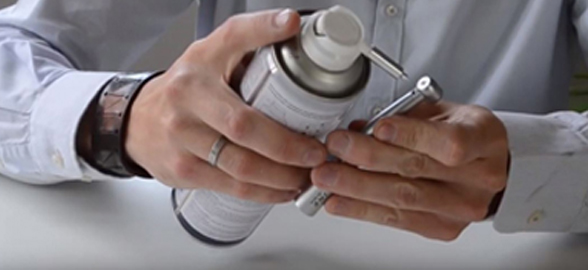Glass ionomer cement is the generic name for a group of materials that arise after the reaction of silicate glass powder and polyalkenoic acid. Initially this dental cement was intended for use in aesthetic restorations for anterior teeth, especially for class III and V cavities. But when its adhesion to the tooth structure and its validity for caries prevention was seen, it was extended for other uses such as: cementing agent, groove and fissure sealant, coating, core build-up and immediate restorations among others.
Over time, its components have undergone many modifications, and today, conventional cement is composed of:
- POWDER: Silica, Alumina, Fluorides
- LIQUID: Polyacrylic acid, itaconic acid, tartaric acid
When both components are mixed (mixing should be fast, between 20 and 30 seconds at powder/liquid ratio 5:1.) in a paste, the acid etches the surfaces of the glass particles so that calcium, sodium, aluminium and fluoride ions are released into the aqueous medium.
Glass ionomers have an acid-base chemical reaction, in which there is an ion exchange between the Ca and carboxyl group. This setting reaction starts when the liquid comes into contact with the powder. The H+ ions attack the glass particles releasing Ca, Al and F and the glass breaks down under the action of the acid, forming a silica gel.
Next, Ca reacts with the polyacids and then with Al. This polyacrylate metal salt starts to precipitate and gelation begins until it hardens. Water is an important component in the setting process as it acts as a plasticiser reducing rigidity. Therefore, during its placement on the tooth it should not dry out as it can contribute to a brittle material and the excess of it favours its dissolution.
Among its advantages we have the release of Fluorine which favors a bacteriostatic activity, greater resistance to compression than zinc phosphate, with similar tensile strength, easy handling and translucent. The high molecular weight of its acidic component initially has an acidic pH but it quickly increases after the mixing has started avoiding pulp toxicity. However, it is very soluble to moisture, so it requires absolute isolation.
Classification:
- Glass ionomer cement.
- Resin-modified glass ionomer cements: The sensitivity to moisture and the low initial resistance of the VSD are a result of the acid-base reaction.
- Composite resins modified with polyacids (Compomers).
- Fluorine releasing composite resins.
Classification according to use:
- Type I: Cementation for fixed restoration.
- Type II: Aesthetic or reinforced restoration: they lack resistance so they cannot support high concentrations of loads that favour fractures.
- Type III: Cavity protectors.
Resin-reinforced glass ionomer cements
These cements were created to offer better aesthetics and chemical stability. To improve their adhesion capacity, the primer was used to remove the smear layer improving the entry of the Ionomer that has a viscous consistency and as a result forms a better hybrid layer.
It presents two types of hardening, the typical reaction of the acid-base type ionomer and that of the photo-activated resins. Among its components we have:
- Powder: Silica, aluminum, fluorine, photoinitiators
- Liquid: Polyacrylic acid, carboxyl copolymers, hydroxyethyl methacrylate (HEMA), water
The following table shows the differences between conventional glass ionomer and resin-modified glass ionomer:

If you liked this post, we recommend you take a look at the others where we talk about the types of dental cements remaining and follow us on our social networks to keep you updated on offers, news and promotions in the dental sector.






